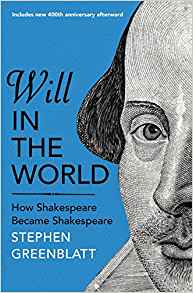Will In The World
Stephen Greenblatt

Effectively ties him in to the world in which he lived. Really interesting.
A certain steadiness, in any case, rings true: it would be hard otherwise to imagine how Shakespeare could have done what he did—learn his parts and perform them onstage, help to manage the complex business affairs of the playing company, buy and sell country real estate and agricultural commodities, compose exquisitely crafted sonnets and long poems, and for almost two decades write on average two stupendous plays a year.
As a practical strategy, this was, of course, absurd: becoming an actor or even a playwright was probably the worst imaginable route toward social advancement, something like becoming a whore in order to become a great lady. But as the legends of whores who become great ladies suggest, there is at work in certain professions a powerful mimetic magic. Onstage Shakespeare could be the person that his mother and father said he was and that he felt himself to be.
Shakespeare was fascinated by the crazed ranting of those who hate modernity, despise learning, and celebrate the virtue of ignorance.
The companies had to induce people, large numbers of people, to get in the habit of coming to the theater again and again, and this meant a constantly changing repertoire, as many as five or six plays per week
By the turn of the century Shakespeare was poised to make an epochal breakthrough. He had perfected the means to represent inwardness.
Above all, it was now illegal to pray for the dead.
But if he fully knew who he was—and the figure of the princely magician suggests that Shakespeare understood what it meant to be Shakespeare—then he may have decided that he had had enough. He would finally be able to turn away from the crowd.